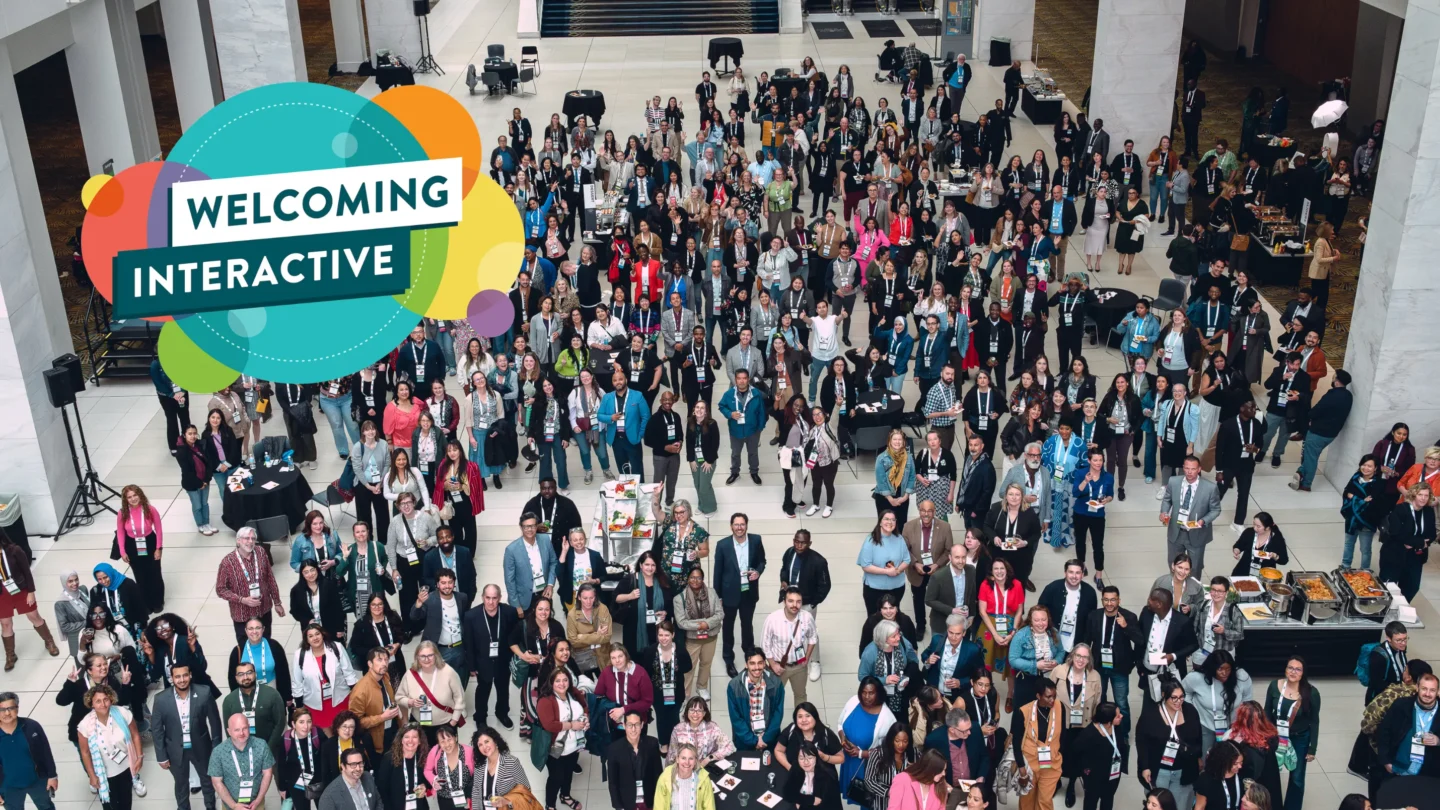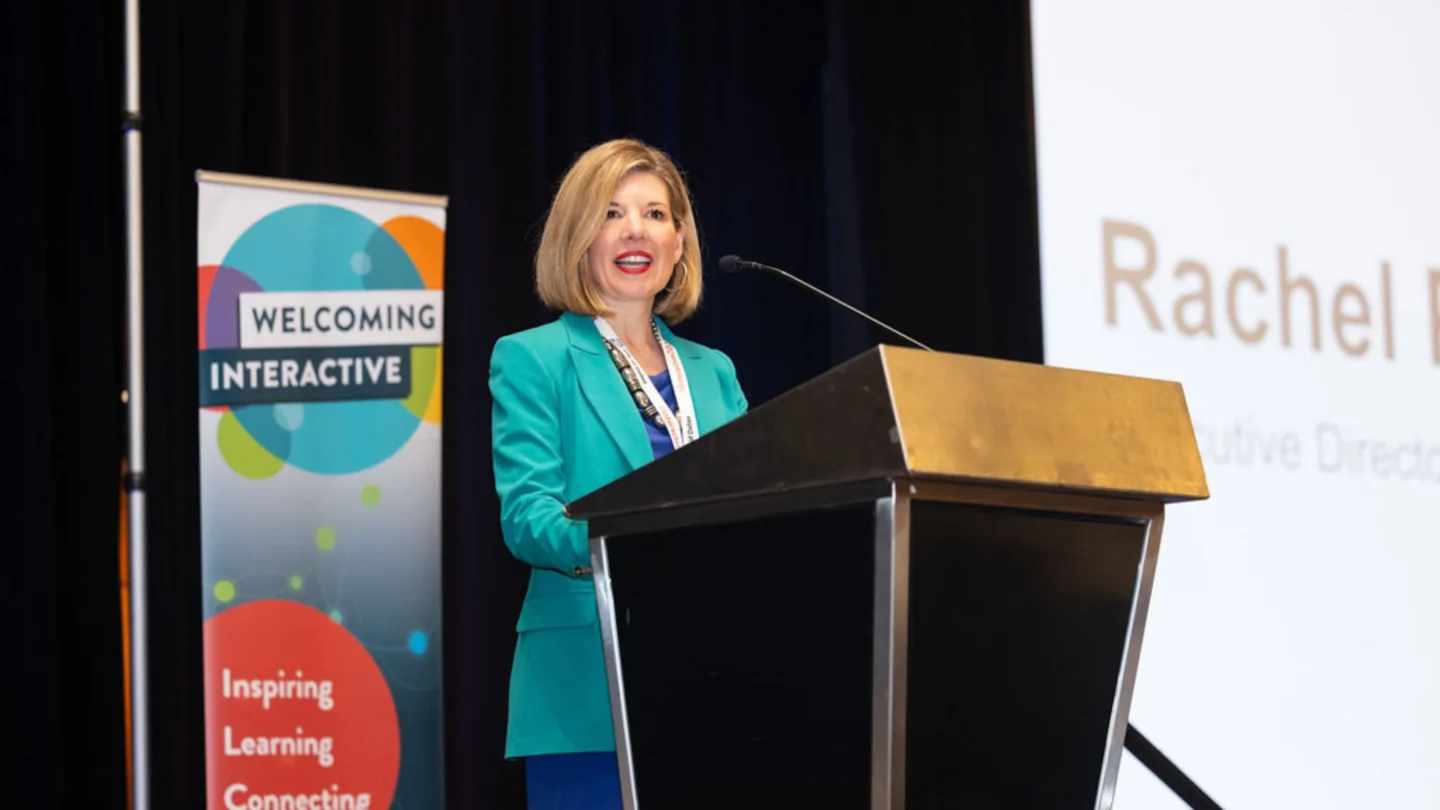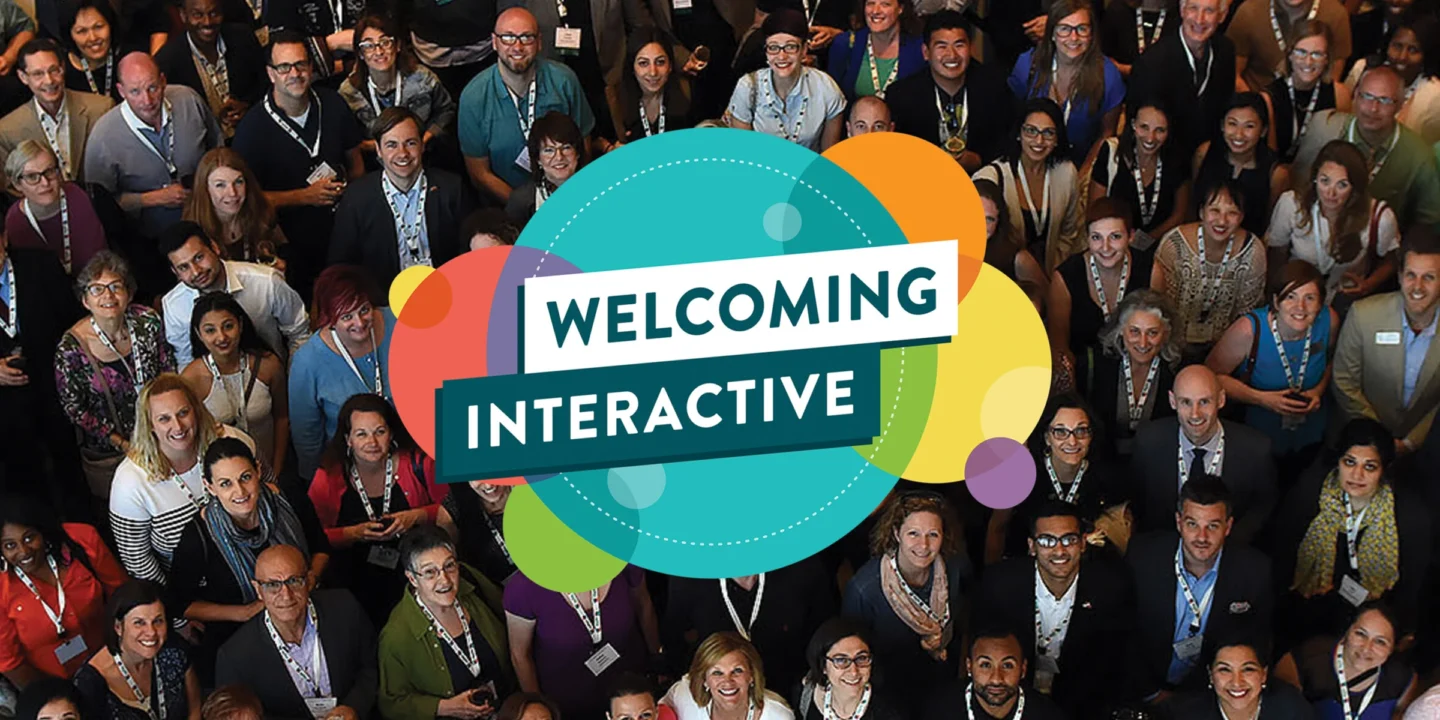Illuminating our shared humanity: Opening remarks from the 2023 Welcoming Interactive
Editor’s note: Following are remarks by Rachel Perić, executive director of Welcoming America, delivered on April 27, 2023 at the opening plenary of the Welcoming Interactive conference in San José, California. It has been edited for web publication.
We are so glad to be here in San José and see the incredible leadership of this community in action in this room today.
Every year, I look forward to this moment to be together, to see this room grow and grow, and be filled with the energy, the creativity, and the power of the growing welcoming movement.
More than a decade ago, a collective of local grassroots leaders came together under the banner of Welcoming America to share the work they were doing to not only push back against anti-immigrant policy and narratives, but to reimagine what could be possible if their communities were truly welcoming places where everyone — including people with immigrant and refugee backgrounds — could thrive, belong, and prosper.
Today — and with a special shoutout to our delegations from Australia and the U.K. — this room reflects more than 500 communities worldwide who are connected in the work of building welcoming places for all.
Together, you have inspired and galvanized millions of people in communities large and small, rural and urban, to make our institutions more equitable, more representative, more responsive, to help neighbors come together as equals to show that community by community, we are capable of being a truly welcoming society.
I’d like to wish our Muslim colleagues Eid Mubarak. In my own home last week, I lit a candle in honor of Yom HaShoah, Holocaust Remembrance Day, honoring the lives not only of Jewish people like my own family who perished under the Nazi regime, but Roma people, LGBTQ+ people, people with disabilities, and righteous people, people who weren’t members of persecuted minority groups but who saw their humanity bound together and who stepped forward to help.
The light of memory and remembrance is a powerful symbol. We light a candle not only to honor the lives of those extinguished by hate, but to be reminded of the light of dignity within each of us.
Not only in the Holocaust, but throughout history, authoritarian leaders have built a mythology based on ideals of superiority and used it not only to persecute some groups, but to extinguish and diminish the inherent dignity and humanity of all people.
Some of you in this room fled these regimes; some of you have experienced their impact personally, and all of us have seen in the work we do every day the legacy of belief systems that present some of us as less worthy, less deserving than others.
We see all around us the consequences of this belief that our race, our gender identity, our sexuality, how we pray, our ability, our economic class and formal education, where we were born or how a country defines our legal status, somehow make us less than or more than; somehow defines our ability to be fully human, fully thrive.
In just the last several weeks, we’ve seen the especially cruel consequences of what can happen when our policies are fed by these narratives of deservedness.
We see the consequences in the fire at a detention center in Tijuana a few weeks ago that took the lives of more than 30 people seeking asylum.
We see the consequences in the exploitation of children who came here without guardians and are now doing some of the most dangerous jobs in America.
We see it in the legislation being proposed in Florida to criminalize undocumented people, [and] to criminalize those that help undocumented people.
We saw it in the point blank shooting of Ralph Yarl, a young Black man who happened to knock on the wrong door.
We see this same cruelty in vicious attacks on and legislation targeting transgender people moving through statehouses.
And right here, in the very place where this hotel stands, more than 100 years ago, there once stood one of the most vibrant Chinatowns in America — but in the 1880s, anti-Chinese sentiment led to an arson that burned it to the ground, not unlike the mob murders and decimation of Tulsa’s Black Wall Street and many other vibrant Black business districts in the years to come.
These are the layers of history we stand on, that our work stands on.
Migration itself has played a complicated role in our history, and the history of California, starting with the genocide and removal of Indigenous people, whose perseverance and survival we honor today.
During the depression of the 1930s, people of Filipino and Mexican heritage in this region were not only subjected to discrimination and violent attacks, but removal and deportation.
When drought and overfarming forced nearly a half million Americans to move west as Dust Bowl refugees, they were met with scorn, called a public health crisis; poor white farmers given the derogatory name “Okies”. And, though it was later declared unconstitutional, California even passed an “Anti-Okie Law,” making it a misdemeanor to “bring or assist in bringing” a poor person into this state.
When Black Americans fleeing racial violence in the Jim Crow South migrated to the Bay Area in the years to come, they encountered policies like neighborhood redlining that not only then, but to this day, hinder their ability to thrive.
There is nothing new about the violence and discrimination that can come from a politics of fear, from us versus them. But what is also true is that throughout history, people have risen above this fear. Not only by taking to the streets, but through their efforts to legislate, to educate, to stand up for each other, to care for neighbors, and help us see each other as neighbors; through the stories we share; through art, in our parks and public spaces; through healing and reconciliation; [and] through the work that each of you in this room are doing today to help us see and defend our common humanity.
We can learn from the past and recognize that migration isn’t a threat but a natural adaptation: to climate, to conflict, to opportunity. Instead of repeating the mistakes of the past, instead of responding to nativist visions of scarcity, we can build our capacity to adapt.
We can acknowledge that adaptation is challenging, both for those newly arriving and for people who have been in a place for generations. This can be the fodder for political opportunists to pit us against each other, or the common bond that brings us together to fight for the things we all deserve.
People can change, can be resilient. I believe that. The work of welcoming communities has proven that.
And it’s also proven that communities can be resilient, too. We prepare our communities with physical infrastructure for floods and fires, for the future, for climate change — we can also prepare our communities for people, for demographic change, by building a welcoming infrastructure that takes us out of the crisis and scarcity narratives that drive our immigration approaches, and into a mindset of planning, resilience, and capacity that helps us to prepare for a future in which more people than ever will be on the move.
We can build welcoming infrastructure that prepares our communities for potential. The potential for our communities to grow, to prosper for everyone, when we remove ZIP code, race, status, language as barriers to thriving, to working, to credentialing, to citizenship, to accessing basic information and services, to being acknowledged as a contributor, a decision maker, not as them, the other, but as belonging, as us.
And yes, while there is an upfront cost to building welcoming infrastructure, there is no end to the long-term benefits for our democracy, for our economy, for the survival of our planet, because so long as we are all in separate tents, we will never get into the big tent we need to build to solve our biggest challenges.
We need our federal government to incentivize communities to build welcoming infrastructure and policies. We were happy to see the Biden Administration stand up the Task Force for New Americans, thanks to the advocacy of many of you in this room. Now we need to make sure we seize the opportunity for our federal government to not only shine a light on the great work all of you are leading at the local level, but make it more widespread, more impactful, make the federal government an enabler of immigrant inclusion; an enabler, and not an obstacle to it. And I want to thank our federal partners who are here today for their support in this work.
We also need federal policies that recognize a welcoming society as the basis for our prosperity and security. We need policies that don’t treat people as expendable for their labor, but as future citizens. We need an Afghan Adjustment Act, comprehensive immigration reform, universal legal representation, a robust refugee resettlement system so that businesses gain talent, aging communities gain population, main streets get revitalized, our children grow up seeing themselves as valued, safe, belonging, the next generation of leaders, rather than second-class citizens.
I’m especially excited to be here in San José because this part of the country isn’t just a hub of innovation in our tech sector, but in welcoming work. This region has shown what is possible when we invest in the power of collective action and the long game of leadership, organizing, and building broad coalitions, not only here but in the rural, agricultural communities of nearby Central Valley, where incredible organizations like CVIIC have shown what’s possible.
Leaders in this region have woven together the work of advancing belonging for immigrant Californians with goals of doing so for everyone. And like a growing number of places, San José’s welcoming work is woven together with its racial equity work, strengthening both efforts in the process.
The leaders in this region will be the first to point to many challenges. Like every community, San José is challenged by its history and the problems every community faces. New people enter this stream of history and can become convenient scapegoats, can become a reason to avoid resolving these challenges. Or, together, with longtime neighbors, and can be co-authors writing a new future that’s better for everyone.
In 2026, the U.S. will celebrate our 250th anniversary. What story will we tell about who we are becoming? I believe we can tell a positive story, an aspirational story built on the work that communities like yours are doing every day to acknowledge our history and galvanize all of us toward a more inclusive future.
Welcoming America’s goal is to reach 50 communities that have been certified as welcoming, by 2026, showing that in both values and in actions, policies and practices, that we are capable of adapting to changing demographics; we are capable of incorporating new people; we are capable of building communities where we all belong, capable of being a successful, thriving multiracial democracy. And we are all the better for it.
Last week, my family lit a candle to commemorate the human lives lost to fear and hate, but today, each of you in this room ignite the flame within me, and I believe within in each of us, to keep holding high the torch that carries the light of justice, equality, dignity for all people, illuminating the good that is possible, the good that is all around us and the light within each of us.
There is no such thing as perfection in this work. We will fall down. But seeing this room today, I know that when we fall, we will help each other up, and we’ll also rise together. And I cannot wait to see what the future holds for the growing welcoming movement.




